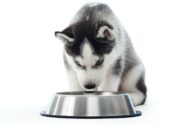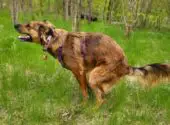What happens if your furry friend refuses to drink? How long can a puppy go without nourishment? These are questions that every pet owner should ask themselves. The lack of nutrition and hydration can pose a significant risk and may even prove fatal if immediate action isn’t taken. Time is of the essence, so pet owners must know how long can a puppy go without eating or drinking.
In this guide, we explore just how long a puppy can survive without food or water, the risks involved, and what you can do to get them to eat and drink again.
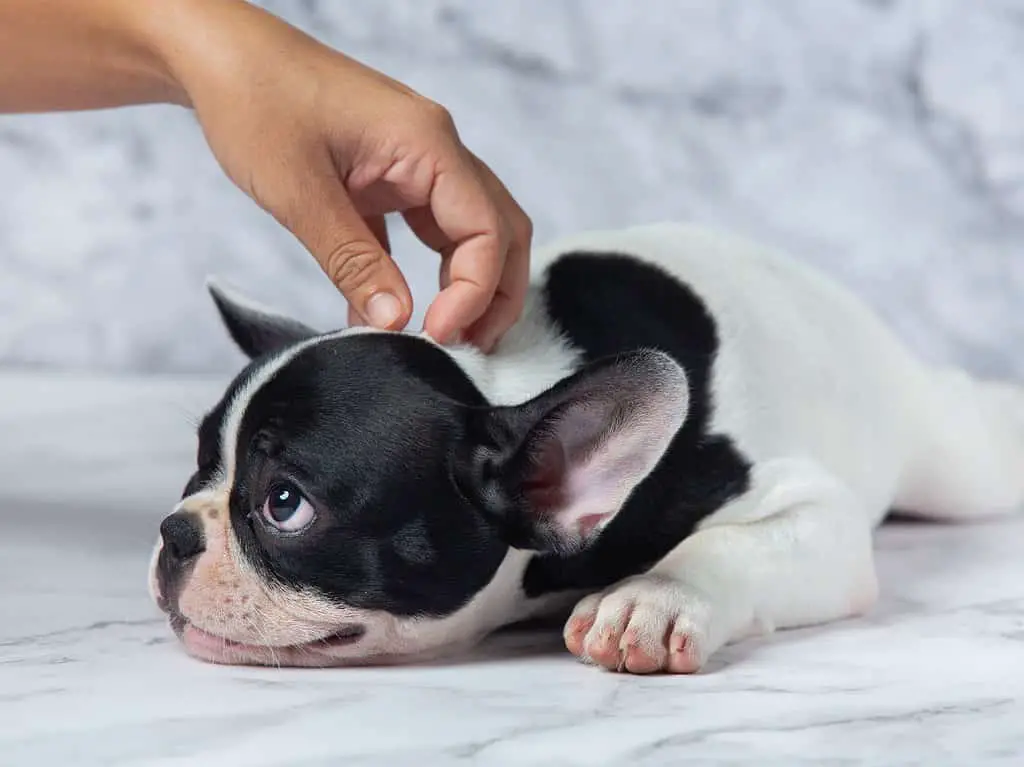
The Importance Of Food And Water For Puppies
Do you just put some kibble into a bowl and let your pup eat it? What if we tell you that the sustenance you give your pup could profoundly influence its health and well-being in its adult years? To offer your tiny companion the best start, read further to discover why nourishment is critical for pups.
Growth and Development: The early stages of puppyhood involve major physical development, and it is crucial to provide proper nutrition that contains the right balance of minerals, vitamins, healthy fats, and proteins.
Energy and Vitality: Puppies have a reputation for being full of energy; thus, they need a healthy and nutrient-filled diet that provides the necessary calories to support their activities. High-quality puppy foods fulfill these requirements and include carbohydrates from sources such as grains or vegetables which can supply enough energy to keep up with their adventures.
Cognitive Development: The nourishment puppies consume is essential for their cognitive growth. Omega-3 fatty acids, particularly DHA (docosahexaenoic acid), are critical to the brain’s development. When supplied in adequate amounts, these fatty acids will facilitate better learning capacities, retention rate, and increased mental sharpness in puppies.
Strong Immune System: Their immune systems have yet to reach full maturity, meaning additional support is necessary to guard them against diseases and infections. A complete diet rich in essential vitamins such as A, C, and E, along with antioxidants, bolsters the strength of their immunity and enables effective defense against sickness. Furthermore, a reliable water supply offers further benefits by promoting optimal functioning of the pup’s immune system.
Healthy Digestion: A balanced diet for puppies is essential for their digestive health, providing the necessary fiber to aid and promote regular bowel movements. This reduces the risk of gastrointestinal issues and constipation while providing beneficial bacteria to improve nutrient absorption and bolster a healthy digestive system.
Dental Health: Proper dental care and diet are necessary for ensuring puppies’ oral health. Chewing on suitable kibble for their size or specially manufactured dental treats can help keep their teeth clean and reduce the likeliness of problems, such as plaque formation and gum disease.
Behavior and Training: A puppy’s behavior and capacity for training are closely linked to an appropriate nutritional regimen. Dietary deficiencies can lead to decreased energy levels, lack of focus, and disruptive or uncooperative behaviors. Combining healthy eating with positive reinforcement techniques will enable a pup to stay mentally alert while responding well to instruction during lessons.
Transition to Adult Food: Ensuring puppies receive adequate nutrition in their formative months is essential to a healthy life. Taking the proper steps regarding dietary needs during this period can drastically reduce future health risks and make transitioning them to adult food more straightforward.
But what about water? Let’s discuss in detail the importance of water for puppies.
Hydration: Water serves an integral purpose in aiding the regulation of body temperature, digestion, transportation and absorption of nutrients into cells, and removal of toxins. Failure to provide adequate amounts could lead to severe complications from dehydration.
Digestion and Nutrient Absorption: Hydration is vital in allowing puppies to digest their food properly and absorb nutrients efficiently. The presence of water facilitates the breakdown of food, swallowing, and digestion processes. Furthermore, it helps transport vital nutrients from the gastrointestinal tract to the bloodstream.
Temperature Regulation: Puppies are more susceptible to heat exhaustion and heatstroke than fully grown dogs due to their limited ability to regulate body temperature. Ensuring they have regular access to cold, fresh water can assist them with cooling down their body through panting and facilitate the dissipation of excess heat from their bodies.
Joint Health: Maintaining the appropriate amount of hydration keeps synovial fluid at an expected thickness, a fluid responsible for lubricating joints. When not sufficiently hydrated, that synovial fluid thickens, resulting in reduced cushioning and joint protection; ergo, resulting in possible pain, stiffness, and potential development of issues such as arthritis.
Urinary Health: Puppies should be adequately hydrated to sustain a healthy urinary system. An adequate water supply will properly excrete toxins, bacteria, and other waste materials from the urinary tract. This minimizes the risk of urinary tract infection or other difficulties related to urination.
Exercise Performance: It is essential for puppy health to receive adequate hydration before and during exercise. Water intake helps sustain stamina, diminish exhaustion levels, and regulate the animal’s body temperature while partaking in strenuous activities, allowing them to experience maximum enjoyment from their physical endeavors.
Overall Well-being: The necessity of water for healthy puppies is comparable to the importance of it for humans. If their hydration levels are balanced, puppies will be more lively and have better mental capacity. Additionally, having the appropriate amount in their bodies will prevent possible dryness and skin issues while promoting a lustrous coat and supple skin.
Feeding Schedule: How Often Should You Feed Your Puppy?
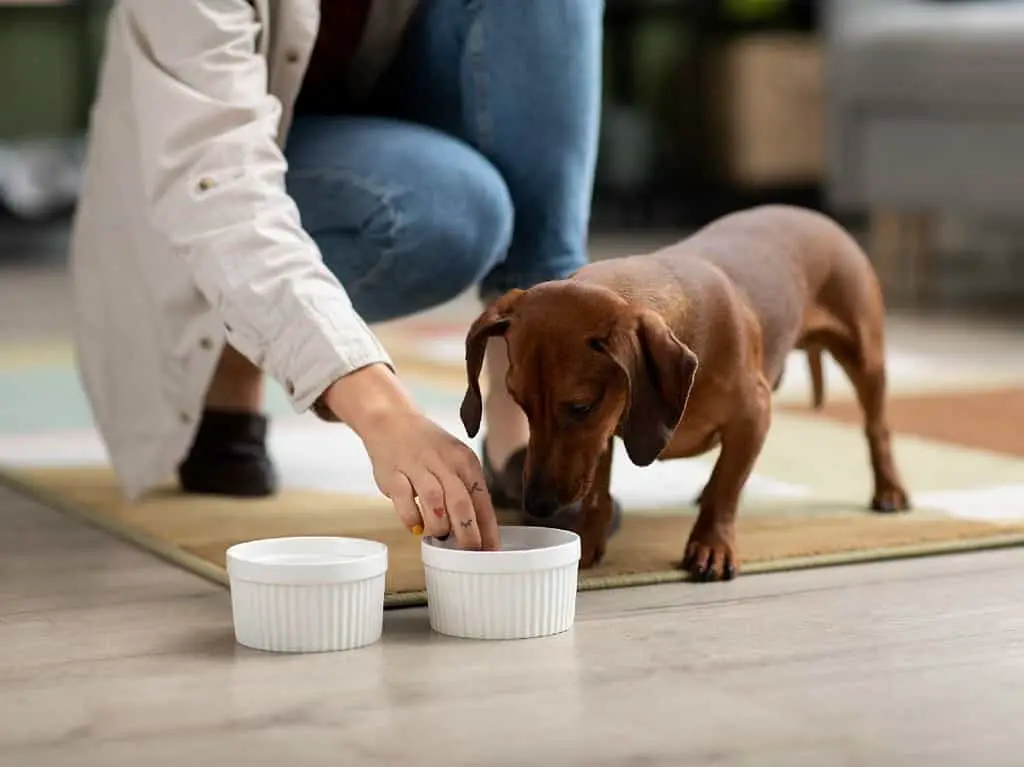
Feeding a puppy the right amount and at the appropriate frequency is crucial for their overall health and development. Various elements should be considered in determining a pup’s meal plan, such as age, breed, size, and individual requirements. Although this article provides a general feeding schedule for pups, seeking feedback from an experienced veterinarian is strongly recommended to obtain personalized advice.
First 6 – 8 Weeks: During a pup’s transition to solid food, which usually occurs between the ages of six to eight weeks, they must receive multiple meals within an appropriate timeframe; it is recommended that puppies should be fed four to six times a day with a mixture of milk replacer explicitly created for puppies and softened puppy food.
8 Weeks to 3 Months: By the age of eight weeks, a puppy will have completed the weaning process and should be fed only solid food. You should divide the pup’s daily dietary requirement into four meals and ensure regular intervals between feedings. Ensure you provide them with high-quality puppy food suitable for their breed and size.
Read also: 12 Worst Dog Food Brands To Avoid This Year
3 to 6 Months: As a puppy grows, adjust the frequency of its meals accordingly. During this period, transition to providing three meals daily and ensure that their serving sizes meet their changing nutritional needs while preventing overeating and promoting healthy body weight. Ensure to provide nutritionally balanced puppy food that matches the pup’s developmental requirements.
6 Months and Beyond: Puppies can typically have their meals cut down to two a day once they reach six months of age, although bigger breeds may require three meals per day until they are mature. To ensure your pup receives the appropriate nutrition, consult a qualified veterinarian about diet recommendations.
Be mindful of your puppy’s body condition and weight development. Ensure their nutritional intake is appropriate for their size by adjusting portion sizes/frequency of feedings as needed. Develop a consistent feeding regime and stick to a strict daily schedule to promote healthy habits.
Always make sure fresh, clean water is provided, especially when they are being fed. Additionally, human food should be avoided as it may risk their health and safety.
Lastly, remember that puppies could have unique dietary specifications or medical conditions necessary for a varied feeding schedule when deciding what and how often to feed.
Water Consumption: How Much Water Should Your Puppy Drink?
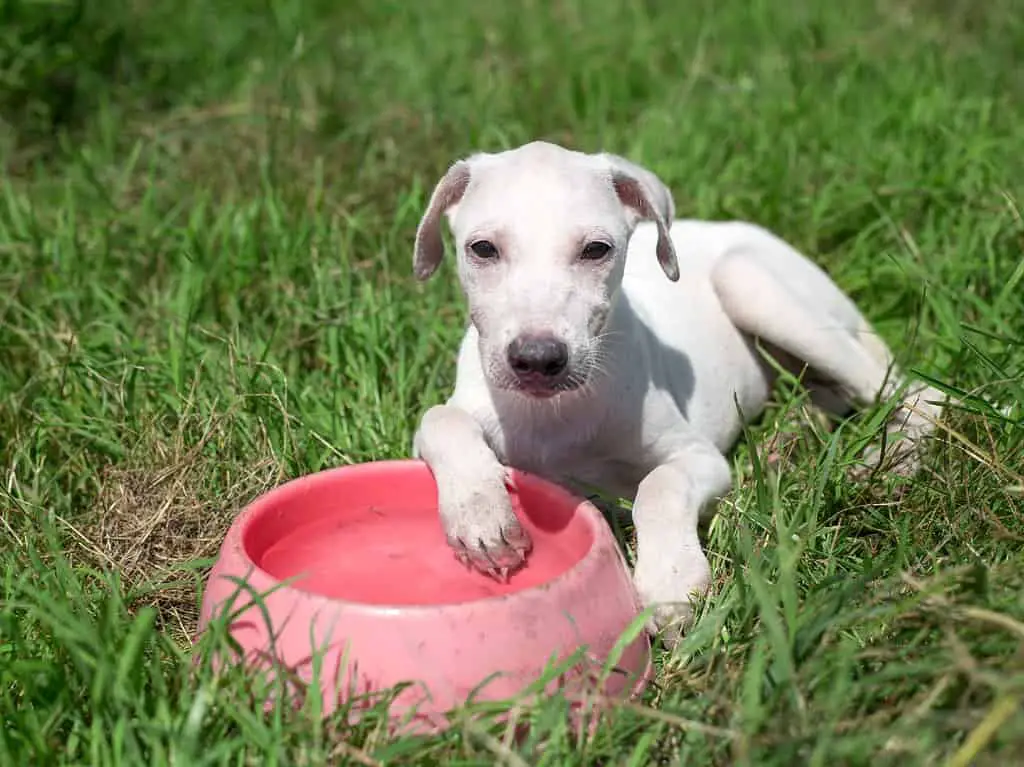
Determining the exact amount of water your puppy should drink can vary depending on various factors, including age, size, activity level, health conditions, and environmental conditions.
Here are some guidelines to consider regarding water consumption for puppies:
Age: The water intake of puppies differs from that of adult dogs due to their increased growth and greater metabolic rate. During the early stages of life, they acquire hydration through their mother’s milk; however, when weaning begins, and they start eating solid food regularly, it is crucial to ensure sufficient access to water.
Size and Weight: Large breed pups will need more water than smaller breeds, as they typically have greater body sizes and require higher amounts of hydration.
Activity Level: Inactive puppies do not require as much water as those that are more active but still need to take in plenty of fluids. Puppies that partake in strenuous physical activities invariably need increased hydration levels due to panting and perspiration, leading to body fluids loss. Therefore, these puppies need to replenish their lost fluids with adequate water.
Weather Conditions: The external environment can affect a puppy’s hydration requirements. Hyperthermia and severe dehydration are common in puppies living in areas with high temperatures and limited humidity. For this reason, fresh water should be readily accessible for your pup day and night.
Their water intake must be carefully monitored, ensuring they remain continuously hydrated. Also, keep an eye on the water level and refill as necessary. Puppies may accidentally knock over their water bowls or spill water, so regular checks are essential.
Why Your Puppy Isn’t Eating
There can be various reasons why a puppy may not be eating. It’s vital to consider the following factors when trying to understand why a puppy is not eating:
Transition Period: It is common for puppies to experience stress or anxiety when transitioning into a new environment. A decrease in appetite can accompany these feelings, though that should return to normal as the puppy settles in.
Illness or Pain: Puppies can develop health issues resulting in a loss of appetite. Infectious diseases, digestive complications, dental pain, or other medical conditions may prevent puppies from wanting to eat. Seek veterinary help if the lack of appetite persists for over 24 hours or has side effects such as vomiting, diarrhea, exhaustion, or weight loss.
Vaccinations or Deworming: Following vaccinations or deworming treatments, puppies may demonstrate reduced appetite. These processes can induce mild distress or side effects, decreasing feeding interest. This is typically temporary, and the puppy should resume feeding quickly.
Food-related Factors: Closely examine the type of food you are feeding your puppy. Make sure that it is suitable for their age and breed. Puppies have distinct dietary requirements, and an inadequate or imbalanced diet can impact their hunger levels. Consider if you recently changed your dog’s food supply, as sudden dietary alterations can also decrease appetite. Moreover, inspect the food’s quality and determine whether it has been kept in an adequate storage area.
Stress or Anxiety: Stress or anxiety are normal responses that puppies, like humans, can experience. Environmental triggers such as sudden changes in routine, excessive handling, loud noises, or new surroundings can cause this response. Providing them with a serene environment and lots of reassurance will help to soothe their anxieties and uplift their appetite.
Overfeeding or Free-feeding: An unregulated feeding schedule or overfeeding your puppy can result in a lack of appetite. To help maintain their appetite, set up a regular mealtime schedule and carefully monitor portion sizes depending on the age and size of your puppy.
Reach out to a vet if your puppy’s disinterest in food persists or is accompanied by other worrying signs. The vet can give a comprehensive assessment, require examinations, and offer tailored directions.
How Long Can A Puppy Go Without Eating
Various components must be considered when determining the maximum duration a healthy puppy should go without food, such as its breed, age, weight, and overall condition. Consequently, it is generally suggested that this period not exceed two days.
To be on the safe side, contact your vet when your pup refuses to eat more than a few meals in succession.
Risks Of Prolonged Hunger In Puppies
If puppies go too long without eating, it can harm their health and well-being. Puppies are still growing animals and require an appropriate diet to support their rapid growth. The potential risks become apparent when they do not receive proper nourishment over a prolonged period.
At the onset, insufficient nourishment can impede a puppy’s physical and developmental progress. Providing them with adequate sustenance is essential for their bone development, muscle growth, and the overall formation of their organs and systems. If left unfed for extended periods, this can lead to inhibited growth patterns, irregular bone structure irregularities, and a weakened immune system that would leave them vulnerable to infections and diseases.
Subsequently, it is essential to note that prolonged hunger can be detrimental to a puppy’s cognitive and behavioral development. Optimal nutrition is integral in properly functioning the puppy’s brain, promoting enhanced cognition. Consequently, puppies with chronic hunger may demonstrate decreased learning processes, restricted problem-solving capabilities, and impaired memory. In addition, hunger may cause heightened anxiety, irritability, and aggressive behaviors.
Furthermore, a puppy that is deprived of regular meals for an extended period can have dire long-term consequences on its metabolism. When starved, the body adjusts to slow down its metabolic rate to conserve energy. When the food eventually returns to their diet, they will have difficulty processing it efficiently due to this altered metabolic state. This could lead to an inability to gain weight quickly when eating the right foods again, resulting in nutritional deficiencies.
As a responsible pet owner, you should be mindful of the consequences that extended periods of hunger can bring about for puppies. Along with physical malnourishment, emotional distress can contribute to feelings of unease, doubt, and uncertainty within them. Thus, one should pay attention to their dietary requirements and how a prolonged lack of nutrition may impede their trust in people and the relationships they form down the line. Not only that, missing out on considerable sleep due to anxiety associated with being hungry can leave dogs lethargic and vulnerable health-wise too.
How Long Can A Puppy Go Without Drinking
Puppies are more fragile than adult dogs and thus need a continued water supply to aid their healthy development. To avoid dehydration, it is essential that puppies be provided access to fresh water at all times and should not go longer than 24 hours without drinking.
Puppies can typically endure limited durations without water, mainly if their diet includes moist foods. However, withholding water may be advised in some cases- such as during medical treatments or pre-surgery under a veterinarian’s supervision. Don’t be alarmed as these situations are managed carefully to minimize potential risks and ensure the puppy’s health and safety.
Signs Of Dehydration In Puppies
Multiple symptoms can indicate dehydration in puppies, the most prevalent being excessive thirst. When observing a puppy’s behavior, if they appear to seek and quickly consume liquid more often than usual, this may indicate inadequate hydration. Additionally, watch out for reduced urination or darker-colored urine, as these two could signify their lack of water.
One can measure a pup’s hydration status by gently tugging on its skin: if the pup is well-hydrated, this action will cause the skin to return quickly to its original place; conversely, if the puppy is dehydrated, it may not return to its original position as quickly or even remain elevated.
Besides reduced activity level, exhaustion, and a decreased desire to eat, puppies may have sunken eyes, dry noses, and coats when dehydrated.
Consult a veterinarian if you suspect dehydration in your puppy. They can provide proper guidance based on the severity of the situation and your puppy’s age, breed, and overall health.
How Can You Get Your Puppy To Eat Again?
Establishing and adhering to a feeding schedule is paramount when encouraging a puppy to eat. This creates a predictable routine for the animal, instilling comfort and security for them. For puppies, the recommended meal frequency is between two to three times daily.
Create a relaxed, peaceful atmosphere for puppies during mealtime. Designate an area without disruptions or distractions, so the puppy can devote its total concentration to eating their food; this will also reduce any stress that may cause them not to eat. Additionally, designating a particular spot for mealtime may generate familiarity and orderliness.
You must also select high-quality, nutritious dog food to draw your pup’s attention. Please speak with a vet who can inform you as to what diet would best meet the needs of your canine based on their age, breed, and nutritional requirements.
Enhancing the flavor of a puppy’s diet can induce their enjoyment in consuming food. There are various ways to do this, including small amounts of wet foods and appropriately seasoned cooked lean meats (i.e., boneless chicken or turkey). Yet, it is vital that puppies not be fed any adverse foods like table scraps or unhealthy human food.
Heating food to the appropriate temperature can elevate its aroma and make it more appealing for your pup. You could attempt hand-feeding, administering small portions, or using puzzle toys that distribute food if resistance prevails. Do not resort to forceful feeding or discipline as these practices may cause aversive connections with meals. Encouragement, support, and compliments should be given generously once interest is expressed or when they have entirely eaten what was given to them.
How Can You Get Your Puppy To Drink Water Again?
If your puppy has not had a drink of water in several hours, measures can be taken to prevent them from consuming liquid again. The first step is ensuring that the bowl is clean and contains freshly cooled water, as puppies find cleanliness more inviting. Placing ice cubes in the bowl on hot days may generate additional interest in drinking it.
To motivate your dog to drink, reposition the bowl away from food and heavy activity, preferably in a quiet spot within easy reach.
Another method for providing hydration to your pup is to manually place drops of water on their lips or through a syringe.
Take a proactive approach to encourage your puppy’s hydration by demonstrating the activity and rewarding them when they drink from the water bowl. Call your vet if your puppy still does not seem interested in drinking.
Final Thoughts
If your pup has gone for an extended time without consuming food or water, it is advised to schedule a veterinary appointment as soon as possible. Prolonged dehydration and malnutrition can cause more severe health complications. Always ensure your furry friend can access clean water and a balanced diet. Your puppy will grow into a happy, healthy companion with appropriate care and attention.
References
Rooney, N. J., Clark, C. C., & Casey, R. A. (2016). Minimizing fear and anxiety in working dogs: A review. Journal of Veterinary Behavior, 16, 53-64.
Khoo, A. W. S., Taylor, S. M., & Owens, T. J. (2019). Successful management and recovery following severe prolonged starvation in a dog. Journal of veterinary emergency and critical care, 29(5), 542-548.

